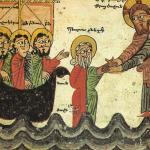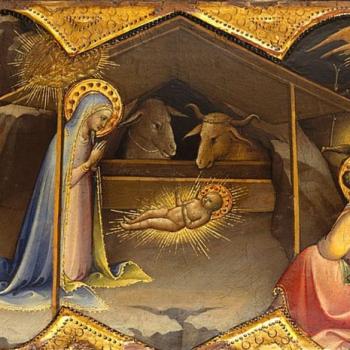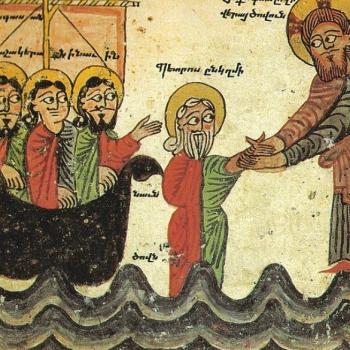In Matthew 28:19, Jesus’ final orders are “Go and make disciples…” But how did the early church obey Jesus and make disciples? They gave new believers the Gospel of Matthew. It’s still a revolutionary idea: what would our spiritual lives look like if our first steps into Christianity were guided by the book of Matthew? It’s time we return to our roots, making and becoming disciples the way Matthew did.
Disciples without Jesus
A few years ago I took my faith apart, piece by piece. Like a lot of people my age, I had a sense that my understanding of Christianity was somehow incomplete. My church upbringing taught me solid principles like “tell the truth,” “love your neighbor,” and “God loves everyone.” But with those principles came contradictory attitudes like “science is evil” and “God definitely doesn’t love those people, so we can’t either.” I still longed for a spiritual connection with God, but something crucial was missing from my Christian experience.

It’s so obvious to me now, but what was missing was a solid foundation in Jesus. And it wasn’t just me – my church, and most of the Christians around me, were also missing Jesus.
I can hear the objections now, and I had them too:
“But he’s the Messiah, the Founder! We celebrate his birth every Christmas, and his death and resurrection every Easter. We sing to him, pray to him, dress up like him for pageants, and tell the world about salvation through him. We call ourselves ‘Christian’ because of him. He’s on our T-shirts, and he’s the ‘J’ in WWJD. How are we missing Jesus?”
Frankly, we’re missing Jesus because of the way we do (or don’t do) discipleship. Our spiritual ancestors had it figured out, but somewhere along the way we strayed from the path.
Church-First Discipleship
Imagine yourself as a new convert to Christianity. If you’re from the West, that probably means you heard a message about God’s love and forgiveness through the sacrifice of Jesus Christ. It resonated. You needed forgiveness, healing, and a new start. You accepted Christ’s invitation to eternal life. Now what?
The obvious answer is to start going to church. In today’s corporate-savvy culture, the church is ready for you with an “onboarding” process that looks a lot like customer acquisition. You get some basic theological teaching on what your church believes. You get a sense of “what we do around here” and what makes your church unique. You learn about the services and programs your church provides. You are guided down a path designed to get you serving (and tithing) as soon as possible.

There are pamphlets, bumper stickers, and merch. You are led, step by step, to a new identity: Church Member.
If your church is a good one, Jesus is part of your discipleship process. If your church is a bad one, once your sins are cleansed by his blood, you’re done with Jesus. His name never comes up again. But in either scenario, Jesus is not the focal point of your new spiritual life. The focal point is your group identity as a member of a church.
Church Can Be an Idol
For millions of Christians, church membership is our spiritual focus. That’s another way of saying that church is our god, and it’s dangerous. We do whatever we have to do to protect our churches, our leadership, and our reputation. We spend our spiritual energy making sure we fit in, and patrolling the borders of our churches to keep the riff-raff out. We end up judgmental and bitter toward the world. We end up indifferent toward God, except when we really need him.
It is possible to live completely untransformed, Spirit-less lives of sin and misery, surrounded by other Christians in T-shirts with “Jesus” printed on them. It’s a nightmare scenario, but I’ve been there. So have you. What is crystal clear is that we are not enjoying the salvation, the enlightenment, or the kingdom of God that Jesus had in mind, or that the earliest Christians shared.
Such are the fruits of idol worship.
As I pondered these things years ago, a choice appeared before me: 1) atheism or 2) go to seminary and figure it out. I chose seminary because I felt God pulling on my soul in ways I couldn’t deny. If modern Christianity wasn’t living up to the gospel’s promises, I had to go back to the beginning. I had to find the Source.
Discipleship in the Early Church
In my New Testament coursework the problem became obvious. It wasn’t just that the early church did things differently. It was that the early church had completely different motivations, and a completely different spiritual focus.
The early church was not about church growth, branding, or creating some kind of corporate identity in its members. The early church was all about Jesus, plain and simple. It was about encountering Jesus, knowing Jesus, loving Jesus, obeying Jesus, worshiping Jesus, and embodying Jesus. Christ truly was King for these people. Each church member was expected to know him and submit their lives to his rule for themselves.
The Gospel of Matthew and Discipleship
We can see the difference most clearly in the early church’s discipleship process. How did the early church make disciples? They gave new believers the Gospel of Matthew. It wasn’t used everywhere, but the Gospel of Matthew used by the first Christians as a catechism, or introduction to the faith for new believers.

When I learned that, it blew my mind. What would our spiritual lives look like if our first steps into Christianity were guided by Matthew’s Gospel? If, instead of instructions on how to be a good church member, someone handed us the book of Matthew and said:
“Here, encounter Jesus for yourself. Learn what he taught. Study his example. His person, his character, his life, and his Spirit are what it means to be a Christian. If you want to follow him, he is the standard. From now on, he is your Teacher. Be like him.”
The more I study Matthew, the more I realize that it truly was Matthew’s intent to write a catechism for new believers. Matthew collects Jesus’ teachings into five sections, organized by topic:
-
- The Sermon on the Mount (Matthew 5-7)
- The Sending of the 12 (Matthew 10)
- Parables (Matthew 13)
- Rules for Community Life (Matthew 18)
- The Olivet Discourse (Matthew 24-25)
Between sermons, we get to see Jesus put his teachings into practice as he encounters all kinds of people. If you want to know who Jesus is and what he expects of his followers, the Gospel of Matthew is the perfect field guide. If it weren’t clear enough, Matthew ends his book with the Great Commission, Jesus’ final direct orders to his followers:
“Therefore, go and make disciples of all nations, baptizing them in the name of the Father and of the Son and of the Holy Spirit, and teaching them to obey everything I have commanded you” (Matthew 28:19-20).
Matthew wrote his Gospel to obey Jesus’ final command and make disciples. Used as a catechism, the Gospel of Matthew still has power to make authentic disciples today.
The Results
I started with me. I began to rebuild my life on Jesus’ teachings. I began with the Sermon on the Mount, and it was painful. In the Sermon, Jesus pulls no punches. He tells you what you’re doing wrong, and his solutions are incredibly difficult acts of faith and humility.
It’s actually much easier to make church people happy than it is to make Jesus happy. But as I tried, failed, and tried again to do what Jesus says, my spiritual life started to flow. I had solutions to problems that I thought were unsolvable. I felt the Holy Spirit transforming my life, inside and out.

When I started teaching my students the Sermon on the Mount as a way of life, I saw the same results. What grew out of our focus on Jesus and his teachings is my new book, Jesus: A Field Manual | How to Live the Sermon on the Mount. The J:FM, as I like to call it is a guide to spiritual growth and authentic discipleship based on Matthew’s Jesus-first example.
Paul writes that we all build on the same foundation – Christ – but we all build with different materials. I can say from experience, as both a disciple of Jesus and a maker of disciples, that church-first discipleship is poor material for building authentic followers of Christ. As a discipleship manual, Matthew’s Gospel is the good stuff. The storms still come and go, but a disciple built on the solid rock of Jesus’ teachings can stand, no matter what happens.
Try it for yourself. If you need help, the eBook of Jesus: A Field Manual is available for pre-order, and the paperback is out on October 3.
Check out my YouTube channel here, and subscribe to my email list for updates by contacting me through my website. Thanks for reading!












